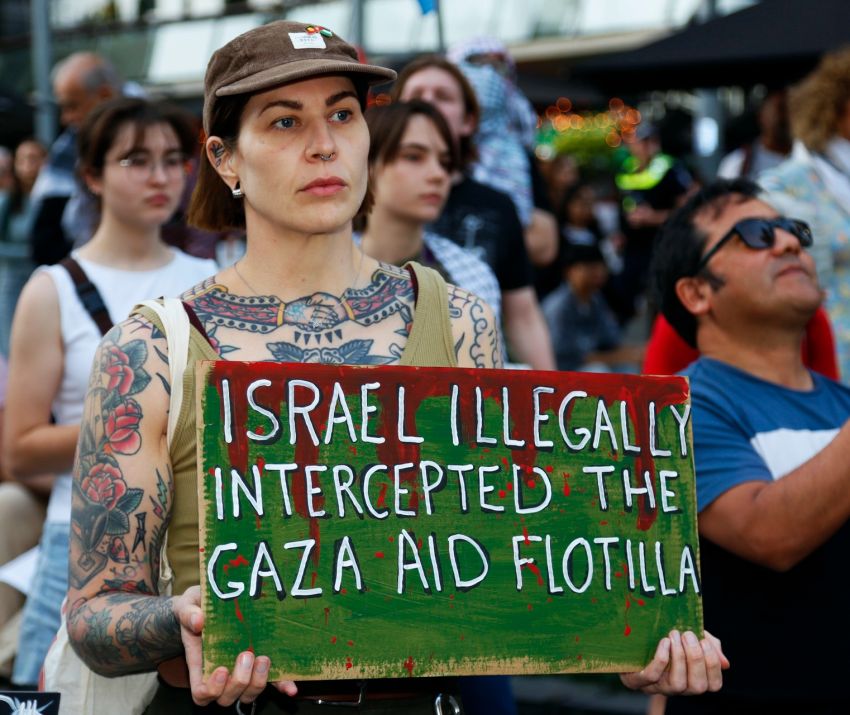
Israel’s detention of the activists on the Global Sumud Flotilla (GSF) was a violent affair. Having been intercepted in international waters on route to Gaza to break the Israeli-imposed blockade, the 470 or so activists, hailing from some 50 countries travelling on 40 boats, were duly taken to the Ketzi’ot Prison complex in the Negev desert in southern Israel.
GSF said the endeavour was intended to “break the illegal siege on Gaza by sea, open a humanitarian corridor, and end the ongoing genocide of the Palestinian people”.
US activist David Adler, who was released and deported to Jordan on October 7, issued an audio message, shared with Al Jazeera, through the advocacy group Progressive International describing the events: “We were kidnapped, stripped, zip-tied, blindfolded and sent to an internment camp on a police van without any access to food, to water, to legal support.”
His Jewishness, along with that of a fellow activist, had been noted by the captors. “After interception, we were violently forced onto our knees into positions of submission, where the two Jews of the flotilla were taken by the ear and ripped from the group for a photo-op with [National Security Minister Itamar] Ben-Gvir, staring at the flag of the State of Israel, taunted by his goons.”
Over the course of five days, Adler endured “serial and systematic violations” of basic human rights. At night, riot police accompanied by attack dogs would raid the prison to strike fear into the interned activists. Adler’s accounts received solid corroboration from other members of the flotilla.
Spanish lawyer Rafael Borrego, after arriving in Madrid, spoke of “repeated physical and mental abuse”. The authorities “beat us, dragged us along the ground, blindfolded us, tied our hands and feet, put us in cases and insulted us”. A statement to Reuters from nine Swiss nationals referred to “inhumane detention conditions and the humiliating and degrading treatment”.
Australians on the GSF referred to prison guards kicking and slapping detainees, the use of sleep deprivation techniques, confiscation of medication and instances of humiliation by being caged and bellowed at by “an Israeli government minister”, namely Itamar Ben-Gvir, who could hardly resist the opportunity.
Surya McEwen recalls being “slapped, having his arm dislocated and having his head slammed into the ground”.
A lot of media has focused on activist Greta Thunberg, who participated for a second time on the Global Flotilla. “I could talk for a very, very long time about our mistreatment and abuses in our imprisonment, trust me, but that is not the story.”
The Guardian reported on her being dehydrated in prison, “insufficient amounts of both food and water”, and rashes caused by bed bugs. She had also been forced to hold and kiss the Israeli flag as photos were taken.
Sweden’s Foreign Minister Maria Malmer Stenergard told the Swedish news agency TT that she had “taken note of the reports of allegations of abusive treatment. If the reports are true, this is very serious.”
The reaction from other countries has not been quite so explicit.
Australian GSF participants were less than impressed by the efforts of their diplomats, given the relative lateness of their release and complaints of mistreatment. US activists also received a cold response from their consular officials. Adler recalls being told by the US General Consul that: “We are not your babysitters. You’d have no food, no water, no money, no phones, no planes.”
Mike Huckabee, US Ambassador to Israel, who gleefully accepted information from the Israeli foreign affairs ministry, made a personal observation of Adler, describing him as a “self-absorbed tool of Hamas”.
The state of Israel has aggressively sought to denigrate the merits of the Global Flotilla, both in terms of its mission and the integrity of its participants. Customary libels were offered, including that Thunberg and other activists were useful idiots and various organisers behind the effort to break the blockade were terrorist sympathisers with links to Hamas.
There was no mention of the humanitarian crisis in Gaza.
As for allegations of mistreatment of the Flotilla participants, the Israeli foreign ministry was dismissive: “The lies they are spreading are part of their pre-planned fake news campaign.”
Ben-Gvir, however, said on October 5 of how “proud” he was of the harsh conditions that the detainees were being kept in. “These are the terrorists of the flotilla,” he declared. “Supporters of murderers.” On his visit to Ketzi’ot Prison, he said that the flotilla members, being “terror supporters”, deserved “the conditions of terrorists”.
Israeli authorities also claimed that the flotilla carried little humanitarian aid. The GSF shot back that such accusations by Ben-Gvir and other officials were “verifiably false” and “obscene”. It said the boats were “meticulously documented, loaded with medical supplies, food and other life-saving goods for people in Gaza being systematically starved by Israel”.
On arriving in Athens after being deported from Israel, Thunberg praised the GSF’s “global, international solidarity” which stood in stark contrast to hypocritical, mealy mouthed governments which had failed to deliver aid. “This is a last resort. That this mission has to exist is a shame.”
At the time of writing, negotiations on the US proposed peace plan continues as does slaughter and starvation in the Gaza Strip.
[Binoy Kampmark currently lectures at RMIT University.]